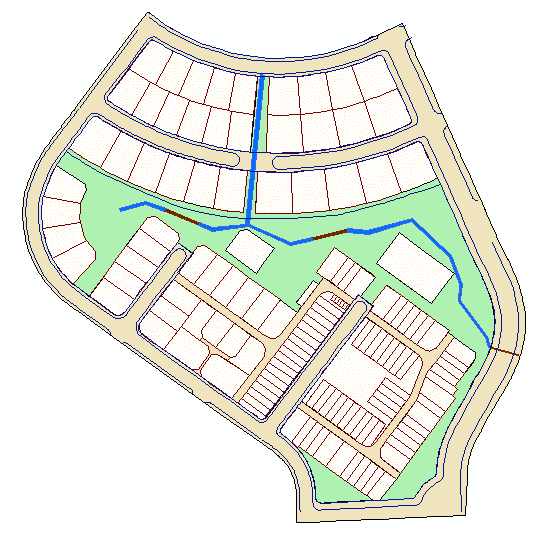Quick Start Example
This is a sample WaterNAM model which has been described in the user’s manual.
Example 1: Steady State Analysis
System response is evaluated for a 6904 ft water distribution network which is fed by a groundwater well. The model is run under steady state condition.
Example 2: Extended Period Simulation
With application of a 24-hour diurnal pattern, the system response is evaluated for the network of Example 1.
Example 3: Fire-Flow Analysis
Network responses have been evaluated for Needed Fire-Flow (NFF) and at a minimum residual pressure. Three hydrant nodes have been analyzed for fire-flow in the model.
Example 4: Design of a Small Diameter Water Main
A small diameter water main has been redesigned to support a new residential facility with an average day demand (ADD) of 150 GPM.
 Example 5: Valve Application
Example 5: Valve Application
Pressure zone of a small segment has been separated by introducing a Pressure Reducing Valve (PRV) in the network. Then the system response is evaluated.
Example 6: Overhead Tank (OHT) Operation
The network has been analyzed for optimizing an OHT operation which floats in the system.
Example 7: Water Quality Analysis for Residual Chlorine
In this example, chlorination process has been analyzed in distributed water throughout the network, which is the most frequent treatment technique.
Example 8: Trace Analysis
The network has been analyzed to trace contribution from a temporary groundwater source to the target location.
Example 9: Water Age Analysis
This example demonstrates water age simulation, thereby determines the amount of time spent by water at different locations after entering from the source.
Example 10: Energy-Cost Analysis
This example demonstrates energy-cost analysis for a pump-operated distribution network, thereby finds optimum pumping schedule.

